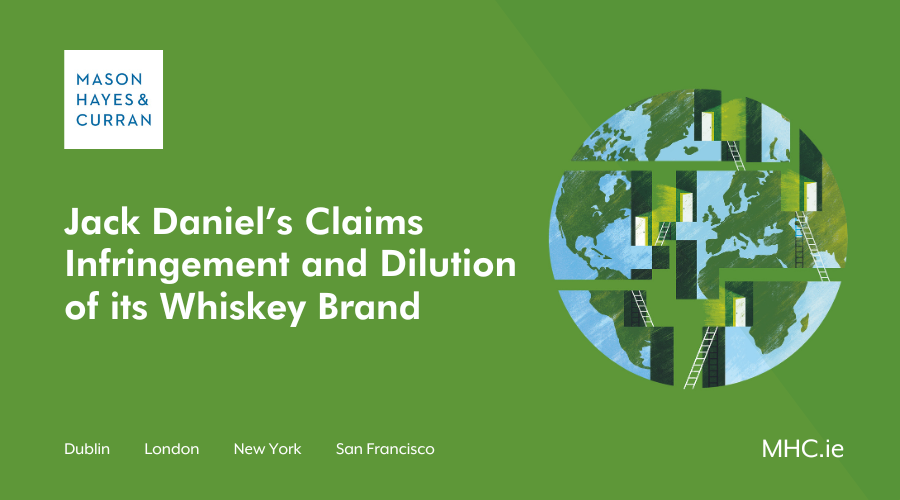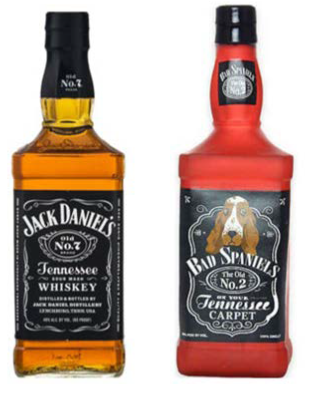Jack Daniel’s Claims Infringement and Dilution of its Whiskey Brand

The US Supreme Court recently handed down a judgment in a case concerning a squeaky, chewable dog toy designed to look like a bottle of Jack Daniel’s whiskey but created by VIP Products LLC. The toy was labelled as ‘Bad Spaniels’ and the ‘Old No. 7 Brand Tennessee Sour Mash Whiskey’ slogan was replaced with ‘The Old. No. 2 on Your Tennessee Carpet’.

Jack Daniel’s Tennessee Whiskey (left) and VIP Product’s ‘Bad Spaniels’ (right)
Jack Daniel’s requested VIP Products cease selling the toys. In response, VIP Products sought a declaratory judgment from the court, recognising that Bad Spaniels neither infringed nor diluted Jack Daniel’s trade marks. Jack Daniel’s counterclaimed for infringement and dilution.
US v Irish trade mark infringement
Under US law, the core federal trademark statute is set out in the Lanham Act. This Act recognises trade marks by their primary function, ie. to identifying a product’s source and to distinguish that source from others. A similar approach is taken in Ireland under the Trade Marks Act 1996 (as amended).
In US infringement cases, the primary question is whether the use of the mark by the defendant is ‘likely to cause confusion, or to cause mistake, or to deceive’ consumers as to the product’s source. Additionally, there is dilution of a proprietor’s mark where the defendant harms the reputation of that mark. Much like in the US, EU and Irish law recognise that a trade mark will be infringed where there is a likelihood of confusion on the part of the public or where the trade mark in question has a reputation, and without due cause, the use of that mark by the defendant takes unfair advantage of, or is detrimental to, the distinctive character or reputation of the mark.
VIP Products’ argument
VIP Products argued that the ‘likelihood of confusion’ test was irrelevant in this instance as Jack Daniel’s could not show that the use of the mark had no artistic relevance to the underlying work, or that it explicitly misled as to the source of the content of the work. VIP Products relied on the Rogers test as set out in Rogers v Grimaldi[1]; a test designed to protect First Amendment interests in the US in the context of trade marks. VIP Products sought to rely on this test instead of the Lanham Act to dismiss the claim, on the basis that the infringement claim involved ‘expressive works’. As for the dilution claim, VIP Products claimed that Bad Spaniels was a parody of the famous whiskey brand and therefore, made ‘fair use’ of its marks.
The decisions of the lower courts
The US District Court rejected both arguments. It was held that where another trade mark is used for ‘source identification’, the Rogers test does not apply, and instead, the infringement claim turns on the likelihood of confusion. Furthermore, the court established that the ‘fair use’ exception for dilution did not extend to parodies where the mark was used to indicate the source of the alleged diluter’s product. The District Court ultimately found that consumers were likely to be confused as to the source of the dog toy and that the toy’s negative reference to dog excrement would harm Jack Daniel’s reputation. This would be known as tarnishment under Irish law.
However, the Ninth Circuit Court reversed this decision. The case was remanded back to the District Court by the Court of Appeals, on the basis that the claim should have been assessed in relation to the Rogers test. As Jack Daniel’s could not satisfy the test, summary judgment was granted to VIP Products by the District Court, and affirmed by the Court of Appeals, on infringement. The Court of Appeals also awarded judgment on the dilution claim to VIP Products, on the basis that Bad Spaniels parodied Jack Daniel’s and therefore fell under the ‘non commercial use’ exclusion.
The US Supreme Court
It was confirmed by the Supreme Court that when a trade mark is used by an alleged infringer as a designation of source for the infringer’s own goods, the Rogers test does not apply. In that instance, when assessing infringement, the question is whether the use of the mark is likely to cause confusion.
Furthermore, it was held that the exclusion from liability for dilution for ‘any non-commercial use of a mark’ doesn’t protect against parody where the alleged diluter uses the mark as a designation of source for its own goods. In short, parody is only exempt from dilution liability if it is not used to designate source. Both issues were remanded back to the lower courts to consider.
Similar case law
This is not the first trade mark infringement case fought between famous brands and dog toy manufacturers. In 2007, the US Court of Appeals determined that chew toys for dogs that imitated a Louis Vuitton handbag donning the label ‘Chewy Vuitton’, were unlikely to cause confusion amongst consumers. A dilution claim was also brought in those proceedings, but the court opined that Louis Vuitton failed to establish its claims of blurring and tarnishment. Louis Vuitton claimed the toy would cause harm to its brand as it was a choking hazard for dogs. However, there was no evidence to support this claim.
Conclusion
Given there is no equivalent to the Rogers test in Irish law, it is likely the Irish courts would take a similar approach to that observed by the US Supreme Court. Infringement would be determined in relation to the ‘likelihood of confusion’ test. Dilution would be assessed in relation to s.14(3) of the Irish Trade Marks Act 1996 (as amended). That section provides a defence for interference with a trade mark’s reputation where there is ‘due cause’ for the use of the mark in such a manner.
In Ireland, parody is a defence to copyright infringement but it has yet to be a successful defence for trade mark infringement. In the UK, it has been acknowledged that parody may be taken into account when considering ‘due cause’ for interference with a mark’s reputation, but the defence has yet to see any success, with academics commenting that ‘a defence of satire or parody is unlikely to be viewed by the court with much sympathy.’[2] Therefore, it is for the Irish courts’ consideration whether a mark used as parody, but also designating source of a diluter’s own goods, would be exempt from liability for dilution.
For more information and expert advice, contact a member of our Intellectual Property team.
The content of this article is provided for information purposes only and does not constitute legal or other advice.
[1] 875 F. 2d 994
[2] Ate My Heart Inc v Mind Candy Limited, Moshi Music Limited [2011] EWHC 2741 (Ch); Kerly’s Law of Trade Marks and Trade Names, 14th edition, [2005]
Share this:

